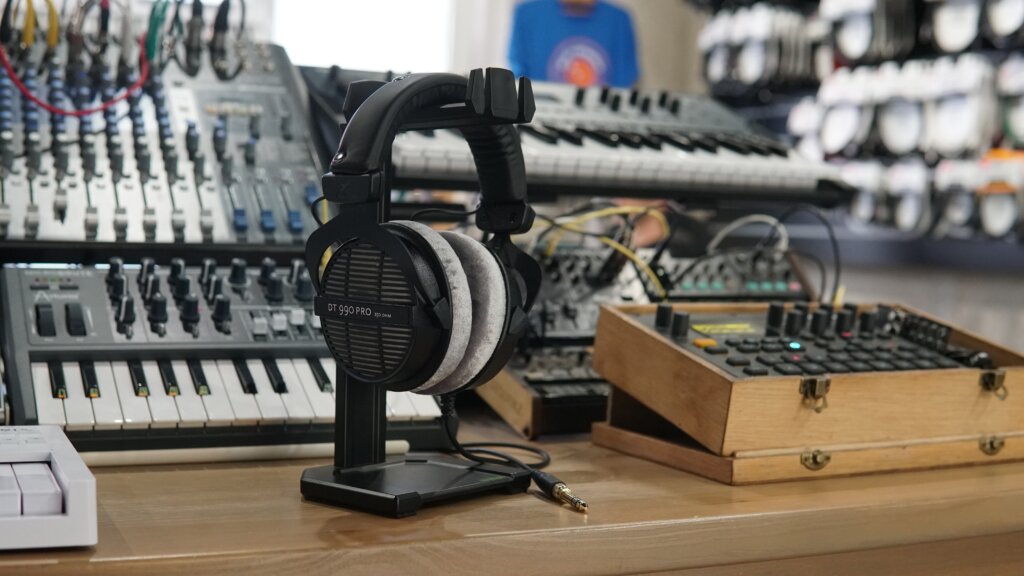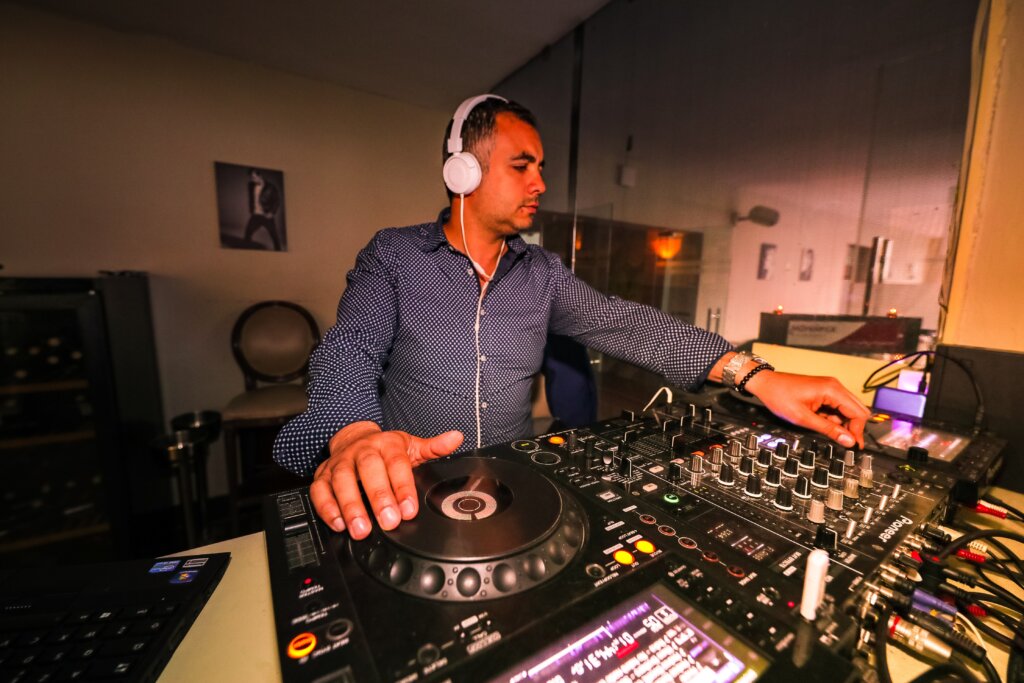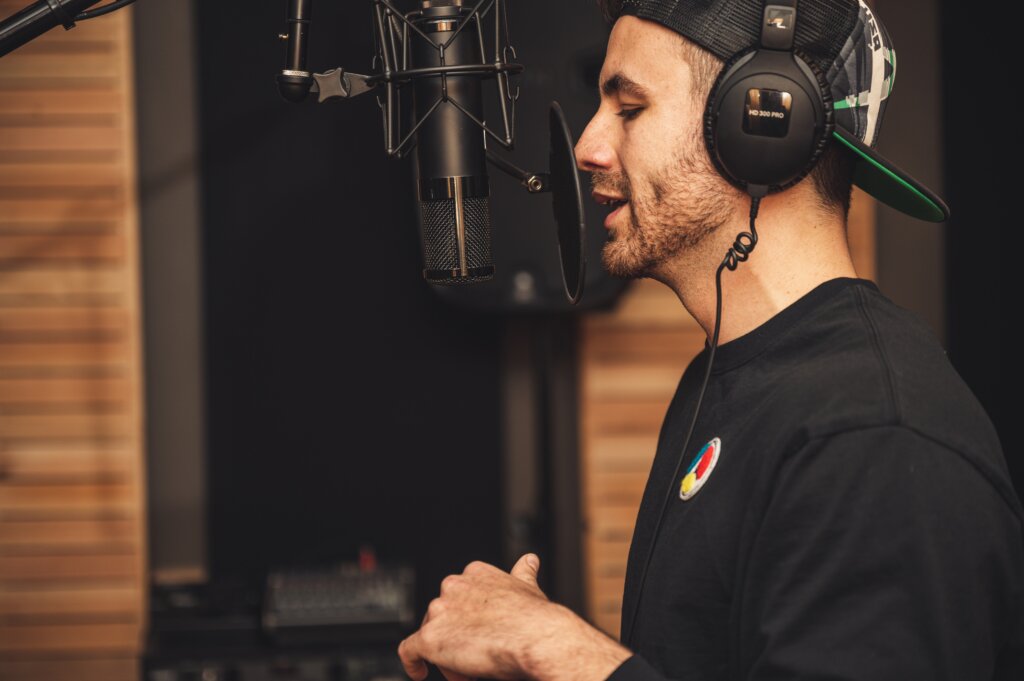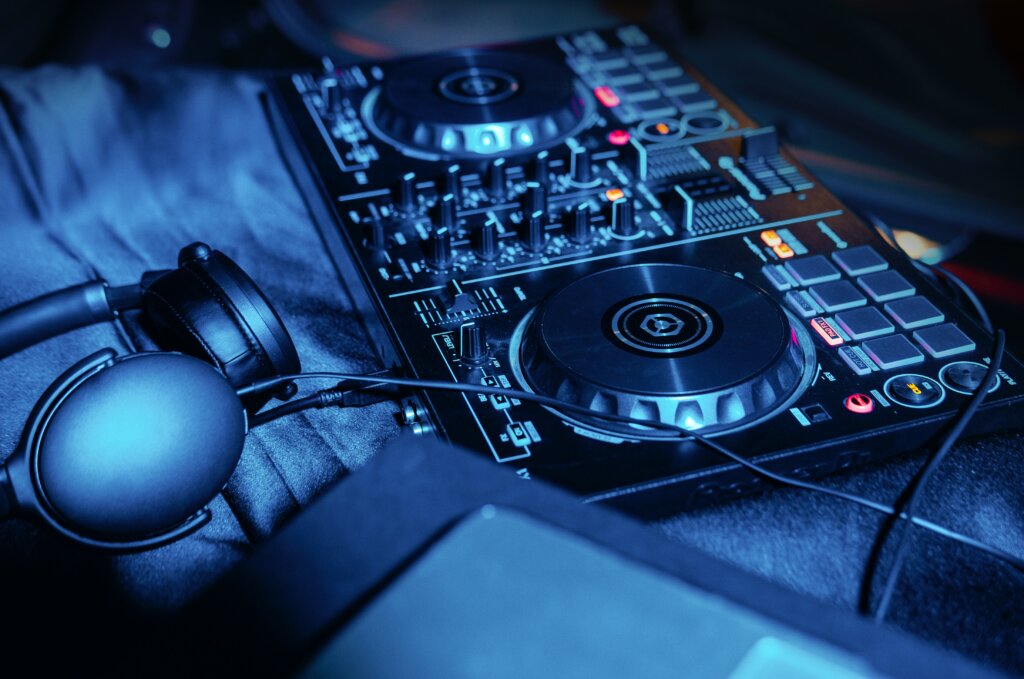When it comes to audio, headphones play a very important role in providing good sound quality. If you are also a part of the world of music, then you must have seen two very special headphones. DJ vs. studio headphones In this article, we will tell you in detail what is the difference between DJ and studio headphones and which headphones you should buy, so stay tuned till the end.

Table of Contents
Difference between DJ headphones and Studio headphones :
1- DJ Headphones

From the name of the DJ headphone itself, it can be known that this headphone is made for DJs only. These headphones have a rotating special character that allows them to be worn on both ears as well as on one ear. This helps them connect with the audience, respond to them, and create an exciting atmosphere without losing sight of the music they are playing.
Along with this, this headphone has a special technology that allows the DJ to listen to two different tracks. This makes it very easy for you to find another track from the one currently playing.
DJ headphones are specially designed for DJs and offer unique features. Which makes mixing and performing simple.
2- Studio Headphones

Studio headphones are generally made for recording studios and personal use. Many brands name their daily-use headphones Studio. Unlike DJ headphones, studio headphones have less technology. Studio headphones play songs as smoothly as you’d expect.
What kind of headphones do DJs use?

There are three types of DJ headphones: semi-open, open-back, and closed-back, so you choose the right headphones according to your concert.
- Closed-back has a very solid cover that seals the sound and completely prevents the audio from escaping. Suitable for those who need to test their mixing in a fast environment. It completely controls the sound and prevents it from spreading outside and disturbing the people nearby.
- Open-back headphones, as you might have guessed from the name, have openbacks that allow sound to come out. This feature is perfect for people who want to hear their environment while mixing. Open-back headphones offer natural and spacious sound.
- For those seeking compromise, semi-open headphones combine elements of both closed-back and open-back designs. They incorporate a solid back panel with open ear cups that provide the isolation benefits of closed-back headphones.
What kind of headphones are used in the studio?

According to the study, there are three types of studio headphones: open-back on the ear, closed-back on the ear, and in-ear.
- If you want to record any applications, then closed-back headphones are considered good because they surround the ears well. And the padding around the ears helps to avoid expansion.
- Open-back cans are a bit lighter and can be worn for longer periods of time, but these headphones generally fall short of expectations and are prone to audio distortion, which is why they are not used as much for recording.
- In-ear headphones, also known as in-ear monitors, are slightly smaller than other headphones. IEMs are high-quality in-ear headphones that are used by audio engineers, musicians, and audiophiles.
DJ headphones vs Studio headphones
DJ headphones and studio headphones both play different roles. DJ headphones allow you to completely customize your music experience. These headphones are more interested in the mixing process than comfortable listening.
In contrast to these are studio headphones, which are designed to have a flat frequency response. This makes the listening experience completely authentic. Which helps producers and studio members identify the flaws in the song before confirming it.
Below are some of the major reasons that make DJ headphones and studio headphones different.
1. Power-Handling
If you compare these two, you will see that studio headphones have the ability to handle higher power. According to the study, these headphones can produce great volume and flat frequencies, whereas DJ headphones do not have the ability to handle high power.
2. Build, Construction and Comfort
You must have experienced this after using DJ headphones and studio headphones. The soft cushioning that lines the ear cups in the case of DJ headphones serves a useful purpose. As you all know, DJs play for long hours, which can cause the headphones to get hot in the ears. Therefore, cushions play a very important role.
It is for these reasons that DJ headphones are particularly comfortable. Have you ever tried to play DJ while wearing studio headphones? And if you have done it, you must have noticed after some time that it is not as comfortable for you. And when it comes to mixing, DJ headphones give a much better experience than studio headphones.
3. Affordability
Making them from good-quality materials and having a compact design is no mean feat, and there is no denying that DJ headphones are a little more expensive than studio headphones. It can be said that DJ headphones are more expensive than studio headphones.
4. Noise Isolation
Compared to DJ headphones, studio headphones cause less noise for the user. And they’re engineered to have a flat frequency response that will make the track sound precisely as intended.
DJs often play for a large crowd of spectators, and sometimes this crowd can be in small places as well. In such cases, it is important for you to listen to the track carefully. DJ headphones block out external noise, making it easier for them to concentrate on their music.
5. Durability and Strength
DJ headphones are made with high-quality materials and can withstand drops better than other headphones. But it is also important to be careful with your headphones.
On the other hand, studio headphones are a bit delicate. And unlike most travel-friendly DJs, these headphones aren’t foldable, so they can’t be included in a compact arrangement, and you can’t even fold them into your bag.
6. Noise Cancellation
Noise cancellation is a very important feature for people who wear headphones, as it eliminates any extraneous noise, allowing you to listen to your music clearly.
And noise cancellation is a feature found in both headphones. Isolation headphones work better than DJ headphones because, when playing in front of a crowd, the DJ needs to be able to hear what he is doing. Mixing a track without noise cancellation will be a little difficult.
Studio headphones can also provide noise cancellation, but they are not as effective. Most studio headphones have an open-back design that allows air to pass through to the speakers.
Which is best for you?
DJ headphones and studio headphones both look almost similar. But there are many differences between them, which are important to know. Which headphones will be good for you will completely depend on you and the purpose for which you have to use it?
According to the study, DJ headphones are specially made for DJs, and they help in the mixing process. On the other hand, studio headphones are designed for people who like to make music; these headphones provide a more authentic listening experience.
Related FAQ’s: DJ Headphones and Studio Headphones
Can I use studio headphones for DJing?
A pair of closed-back studio headphones would be a good choice, but you should keep a few things in mind. The best DJ headphones have rotating ear cups or a flexible headband that allows you to listen to the club mix from one ear and monitor from the other.
Can you use DJ headphones as normal headphones?
You can use the DJ headphones as any of your regular headsets. If you are a music lover, then you must have researched high-performance headphones by now.
Can you use any headphones for recording music?
If observed, closed-back headphones are suitable for recording audio. These headphones help block external noise. That’s why you can monitor your audio instead of wondering what’s happening.
Conclusion
If you are interested in music making and DJing, then it is very important for you to have the right headphones. DJ headphones are built for the stage. They give you complete control and also last a long time. Studio headphones, on the other hand, are used in recording. These headphones help you catch every little imperfection. In this article, we have told you what the difference is between DJ headphones and studio headphones, so read the above article carefully.
